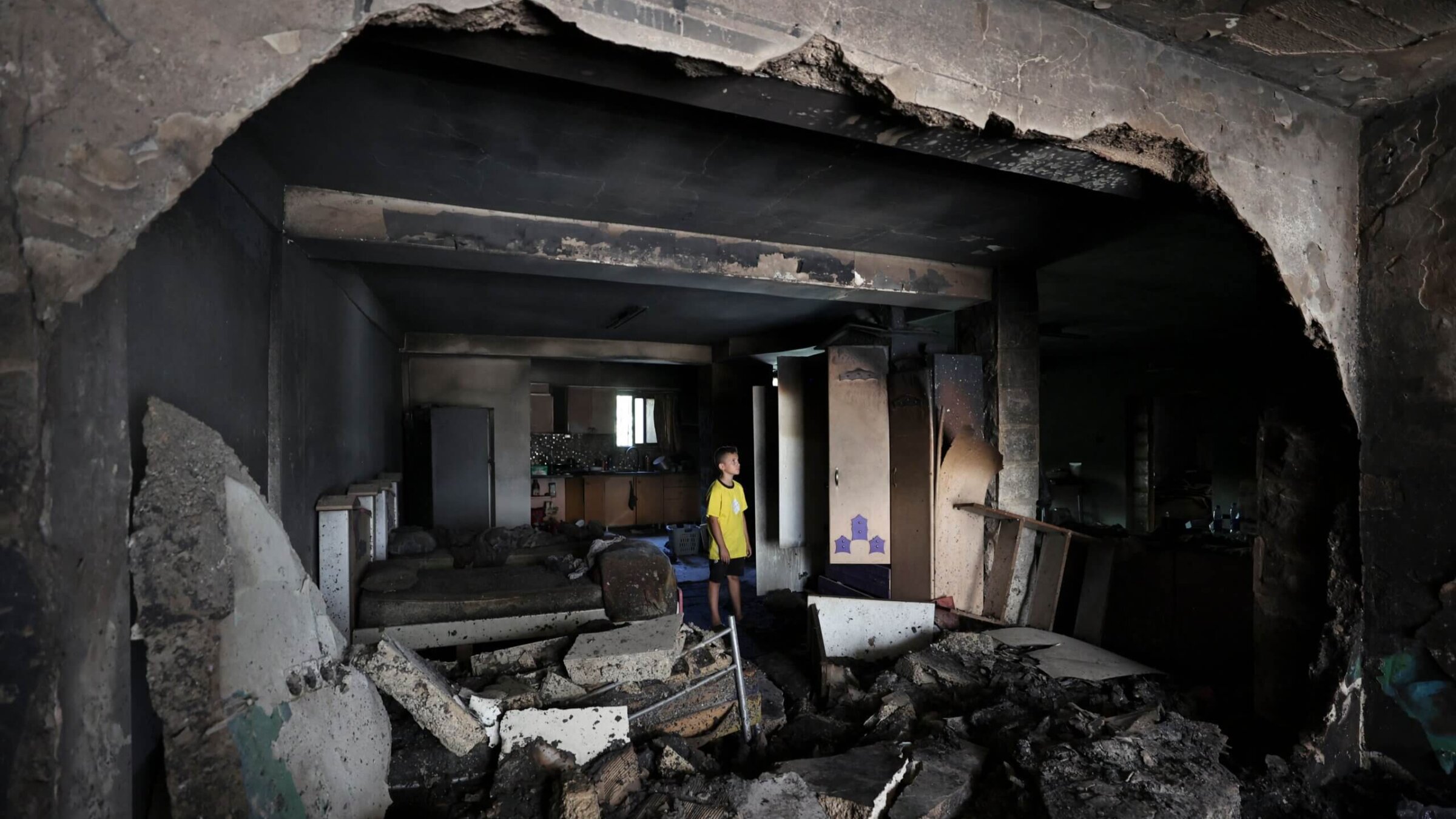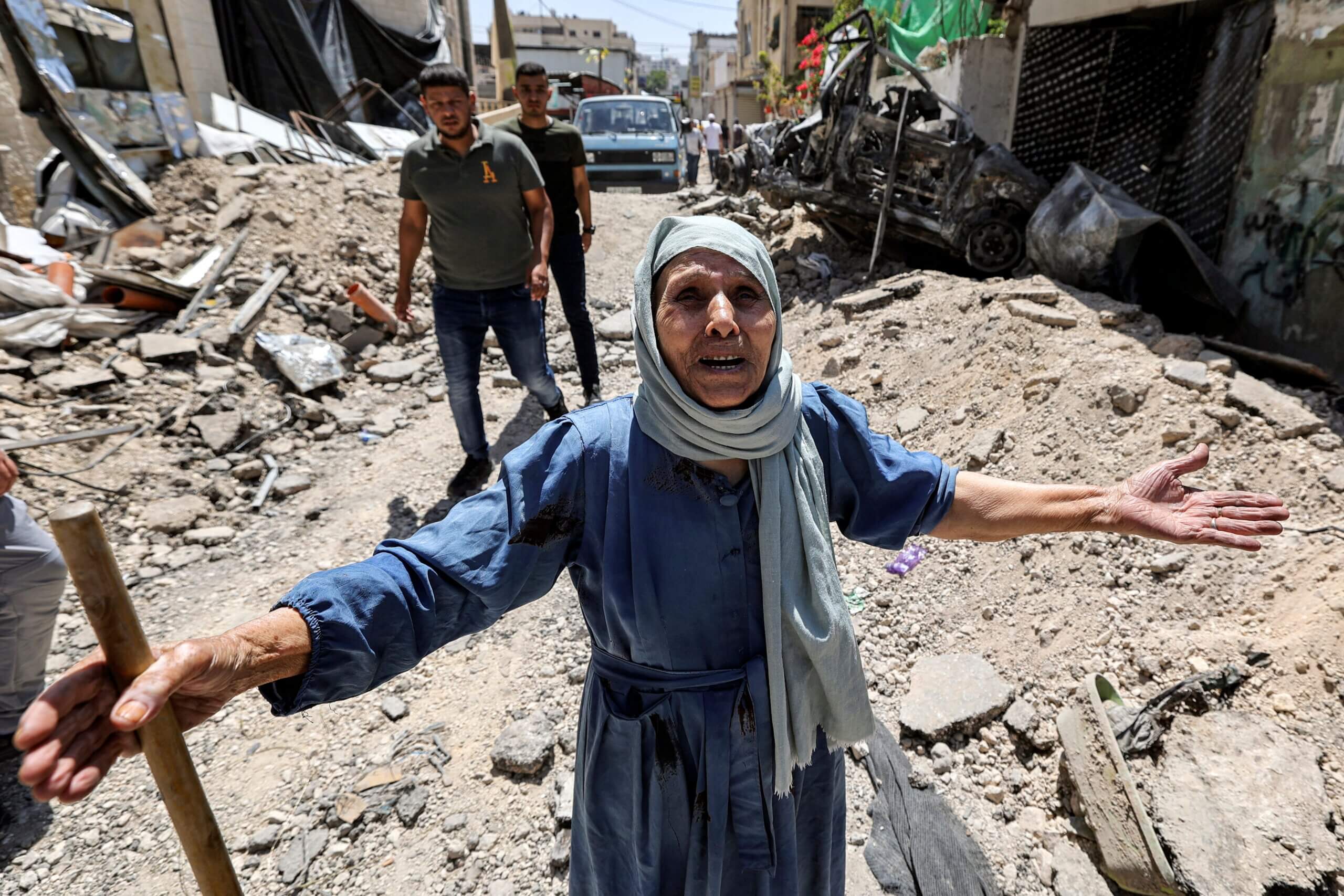After Jenin, Palestinians hate the Palestinian Authority even more. It’s still the only shot at peace
Jenin could be the nail in the coffin of the Palestinian peace camp — unless the US steps in

A boy checks the damage inside a house in the occupied West Bank Jenin refugee camp on July 6, 2023, following a large-scale Israeli military operation that lasted for two days. Photo by Zain Jaafar/AFP via Getty Images
Once the dust settled in Jenin after the IDF’s operation, its largest in the Occupied West Bank in two decades, the scene was unprecedented and extremely dangerous. I don’t only refer to the vast destruction of the refugee camp’s infrastructure that will antagonize Palestinians and act as a recruitment poster for armed groups. What is most concerning in the immediate aftermath of Jenin is the demise of the Palestinian peace camp and the weakening of moderate forces.
On July 5, the top leaders of the Palestinian Authority and its ruling party, Fatah, came to visit the devastated refugee camp, only to be kicked out immediately amid chants of “Shame!” by irate Palestinian crowds who deemed them “collaborators” with Israel. Shortly after, Palestinians gathered to throw stones at the PA’s Security Forces headquarters in Jenin in protest of their inability to defend the city against the IDF or to defend other villages against settler “nationalist terror” attacks, as the IDF recently called them.
These incidents, along with a retaliatory terrorist attack in Tel Aviv the day before, were some of the immediate tangible results from Israel’s operation “House and Garden,” a reality that should be worrying even to Israel’s supporters.
Why does the PA matter?
The PA is undoubtedly loathed and unappreciated on both sides of the conflict. At the same time, its existence is indispensable to both peoples: to maintain stability and security, provide a lifeline to Palestinians, disincentivize violence and, ultimately, negotiate a settlement to the conflict.
Its imminent collapse would be catastrophic to both sides, whether in terms of sparking chaos and uncontrollable violence or crashing the fragile and immiserated Palestinian economy. That’s why even its strongest adversary, Israeli Prime Minister Benjamin Netanyahu, said last week: “We need the PA. We must not allow it to collapse.” (He added that Israel must simultaneously “crush” the Palestinian aspiration for statehood, which means confining the PA to being a subcontractor to the occupation.)
The PA’s problems
In Israel and the U.S., the PA is often perceived negatively, and sometimes demonized, because of its payments to Palestinian prisoners in Israel, and the families of individuals killed or wounded by Israel, including members of armed groups.
The Palestinian perspective on the PA, however, is even more unfavorable. They are perceived as corrupt autocrats unrequitedly helping to police the occupation through their security collaboration with Israel. The PA provides critical intelligence to Israeli security agencies, carries out arrests against Palestinians on Israel’s behalf and thwarts armed actions against Israel.
Additionally, the PA is not allowed, per the Oslo Accords, to provide any protection to its own people against Israeli attacks, whether from extremist settlers or Israeli soldiers. When Israel’s army invades Jenin, for example, which lies under the PA’s full security and civil control, PA security forces are obliged to withdraw from the field and hide completely until the army leaves the area.
Until there is a clear sustainable alternative on the table, abolishing the PA cannot be the resolution to its long list of problems and dysfunctionalities. Instead, it must be reformed with assistance from the U.S.
The PA as a symbol for the Palestinian peace camp
The PA under its octogenarian President, Mahmoud Abbas, formally opposes terrorism and armed resistance and endorses the two-state solution. That’s why Israel’s former prime minister Ehud Olmert held a joint conference with the PA president in 2020 and said: “Abbas is a man of peace. He is opposed to terror. And therefore he is the only partner that we can deal with.”
While there are many moderate Palestinians outside the PA, the PA remains the formal symbol on the Palestinian side of a political organization committed to a peaceful and negotiated settlement to the conflict rather than taking to arms.
For a long time, many Palestinians have put up with the PA’s unrequited security collaboration with Israel and opposition to armed resistance against the occupation, with the hope that its diplomacy and peace process would lead to a solution that provides us with freedom, dignity and security.
Years of fluctuating negotiation rounds, punctuated with disappointments, hostilities and continued settlement expansion, tanked the PA’s popularity and wore Palestinians’ patience thin. That only intensified after the formal end of peace talks with the collapse of former U.S. secretary of state John Kerry’s initiative in 2014.
To survive and preserve some of its depleted domestic legitimacy, while still satisfying its Western donors, the PA pursued symbolic victories against Israel through international advocacy at the United Nations and the International Criminal Court. This was a way of avoiding any direct physical confrontations with the occupation, maintaining relations with Israel and simultaneously saving face in front of the Palestinian public.
However, this path hasn’t borne any tangible fruits either, leading Palestinians to further question the functionality of the PA beyond being a mere ATM machine and service provider.

Moreover, figures like Israel Labor Party leader Merav Michaeli have noted that, for years, Netanyahu’s government has been openly pursuing a policy that weakens, humiliates and cages the PA while strengthening Hamas. For instance, while Israel has annually withheld over $180 million of the PA’s revenues, in order, they argue, to offset stipends paid to prisoners in Israel and their families, Netanyahu allowed almost twice that amount to flow to Hamas via Qatar since 2019. The only logic behind such policy is to fuel Palestinian division and undermine prospects of Palestinian statehood.
Increasing isolation
Successive Israeli governments have also been cracking down on almost all forms of Palestinian non-violent resistance. It deemed international advocacy at the UN as “diplomatic terrorism,” boycotts as “economic terrorism,” hunger strikes as “terrorism in prison,” human rights advocates as “terrorists in suits” and building in Area C of the West Bank as “construction terrorism.”
The new Israeli government, the most far-right in its history, has dramatically escalated the delegitimization of the PA and the entire Palestinian peace camp. Today, it’s becoming increasingly difficult for Palestinian moderates and advocates of peace to speak up, with immediate pushback to calls for dialogue: “Peace with who? Itamar Ben Gvir? Or Bezalel Smotrich and the fanatical camp of Greater Israel?”
If one calls for a two-state solution these days, the prompt question is “Where and how?” The current Israeli government has approved this year the biggest settlement expansion on record and is advancing annexation both de facto and de jure.
If one calls for adopting non-violence instead of armed resistance, they are shunned. “Show us one significant result your advocacy of peaceful action has produced!” people demand.
The consequences of this are severe. The growing armed resistance trend in the West Bank has no strategy or vision. It rather represents a young, disenfranchised and fed-up generation having no horizon or hope and seeking to shake up the status quo and make some loud noise.
The PA has no desire to confront these armed groups, as it might trigger mass unrest and end the PA’s power, particularly at this moment of high tension where Palestinians feel isolated, abandoned and existentially threatened with no recourse.
The US can help
There are three urgent things the U.S. can do to aid the PA and the Palestinian peace camp. The first is economic, by pressuring Israel to release the PA’s withheld funds to prevent its financial collapse, which would aid it to secure additional sources of revenue and boost the weak Palestinian economy. This would not only empower the Palestinian private sector but would increase entrepreneurial and collaborative programs, not just with the U.S., but with Abraham Accords countries that now enjoy a positive relationship with Israel.
The second is symbolic, to take steps that reduce the sense of abandonment and isolation among Palestinians. Measures such as reopening the U.S. Consulate in Jerusalem, platforming Palestinian moderates in major forums and taking principled vocal positions on developments on the ground would go a long way toward strengthening the Palestinian voices for peace.
The third is political, to push for general democratic elections — Abbas has postponed elections since 2006 — as a gateway to restoring the connection between the public and their chosen leadership. This action would go a long way toward improving the public’s responsiveness and cooperation with an elected government. It would revive electoral accountability that helps to deter corruption and autocracy.
Reviving a genuine and serious political peace process between the two sides to end the occupation is the only true solution that would significantly calm the situation on the ground.
To contact the author, email [email protected].

















